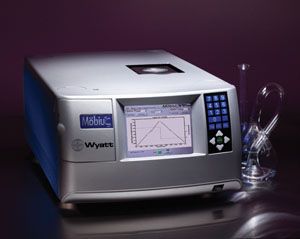On-Line Zeta Potential Measurements
Wyatt Technology?s Möbius is the first and only light scattering instrument that makes reliable, reproducible, and non-destructive zeta potential measurements of macromolecules as small as 1 nm, under dilute solution conditions.

Wyatt Technology’s Möbius is the first and only light scattering instrument that makes reliable, reproducible, and non-destructive zeta potential measurements of macromolecules as small as 1 nm, under dilute solution conditions. The Möbius was designed with the goal of measuring the mobility and the hydrodynamic radius of precious biological samples without perturbing these fragile species.
But another advancement relates to the ability of the Möbius to automate zeta potential measurements by connecting the device to an HPLC pump and autosampler. Since the cell of the Möbius can be plumbed in line, and can withstand very high pressure, it is ideally suited to multiple, sequential measurements using conventional chromatography apparatus.
The Möbius instruments join Wyatt Technology’s unique light scattering systems which include the miniDAWN TREOS, as well as the Optilab rEX—the only refractive index detector available that can be built to operate at any wavelength selected by the customer.
Contact: Geofrey Wyatt
Tel: 805-681-9009
FAX: 805-681-0123
E-mail: info@wyatt.com
A Matrix-Matched Semiquantification Method for PFAS in AFFF-Contaminated Soil
Published: April 14th 2025 | Updated: April 14th 2025Catharina Capitain and Melanie Schüßler from the Faculty of Geosciences at the University of Tübingen, Tübingen, Germany describe a novel approach using matrix-matched semiquantification to investigate per- and polyfluoroalkyl substances (PFAS) in contaminated soil.
Silvia Radenkovic on Building Connections in the Scientific Community
April 11th 2025In the second part of our conversation with Silvia Radenkovic, she shares insights into her involvement in scientific organizations and offers advice for young scientists looking to engage more in scientific organizations.





